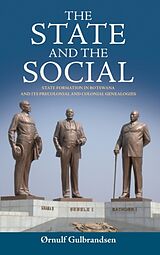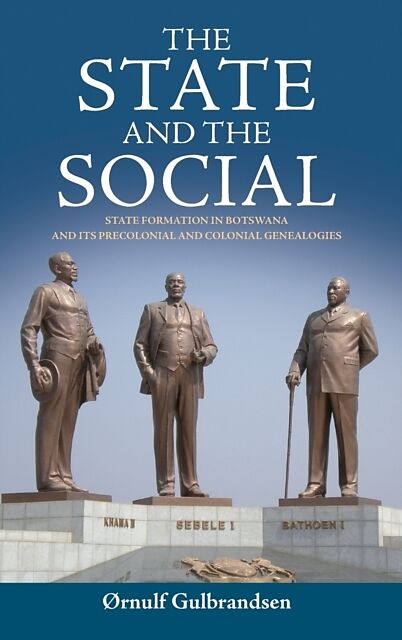The State and the Social
Einband:
Fester Einband
EAN:
9780857452979
Untertitel:
State Formation in Botswana and its Precolonial and Colonial Genealogies
Autor:
Ørnulf Gulbrandsen
Herausgeber:
Berghahn Books
Anzahl Seiten:
364
Erscheinungsdatum:
01.03.2012
ISBN:
0857452975
Informationen zum Autor Ørnulf Gulbrandsen is Professor of Social Anthropology and has been the Head of the Department of Social Anthropology at the University of Bergen for many years. He has conducted fieldwork in Norway, Botswana and, recently, in Sardinia. He has published extensively in books and international journals, especially on politics/state formation, law/jurisprudence, cosmology/occult practices, evangelizing Christianity, space, industrial relations/trade unions, political economy/labour migration, cultural ecology/land tenure, and kinship/marriage. Klappentext Botswana has been portrayed as a major case of exception in Africa-as an oasis of peace and harmony with an enduring parliamentary democracy, blessed with remarkable diamond-driven economic growth. Whereas the "failure" of other states on the continent is often attributed to the prevalence of indigenous political ideas and structures, the author argues that Botswana's apparent success is not the result of Western ideas and practices of government having replaced indigenous ideas and structures. Rather, the postcolonial state of Botswana is best understood as a unique, complex formation, one that arose dialectically through the meeting of European ideas and practices with the symbolism and hierarchies of authority, rooted in the cosmologies of indigenous polities, and both have become integral to the formation of a strong state with a stable government. Yet there are destabilizing potentialities in progress due to emerging class conflict between all the poor sections of the population and the privileged modern elites born of the expansion of a beef and diamond-driven political economy, in addition to conflicts between dominant Tswana and vast other ethnic groups. These transformations of the modern state are viewed from the long-term perspectives of precolonial and colonial genealogies and the rise of structures of domination, propelled by changing global forces. Zusammenfassung Botswana has been portrayed as a major case of exception in Africa - as an oasis of peace and harmony with an enduring parliamentary democracy! blessed with remarkable diamond-driven economic growth. Whereas the "failure" of other states on the continent is often attributed to the prevalence of indigenous political ideas and structures... Inhaltsverzeichnis List of Illustrations Foreword by Bruce Kapferer Preface Introduction Chapter 1.The Development of Tswana Merafe and the Arrival of Christianity and Colonialism Chapter 2. Tswana Consolidation within the Colonial State: Development of a Postcolonial State Embryo Chapter 3. Cattle, Diamonds and the Grand Coalition Chapter 4. State Capture of Indigenous Authority Structures: Ambiguities of Confrontation and Cooperation Chapter 5. Tswana Domination, Minority Protests and the Discourse of Development Chapter 6. Anti-Politics and Questions of Democracy and Domination Chapter 7. Governmentalization of the State: On State Interventions in the Population Chapter 8. Escalating Inequality: Popular Reactions to Political Leaders Conclusion Bibliography Index ...
Autorentext
Ørnulf Gulbrandsen is Professor of Social Anthropology and has been the Head of the Department of Social Anthropology at the University of Bergen for many years. He has conducted fieldwork in Norway, Botswana and, recently, in Sardinia. He has published extensively in books and international journals, especially on politics/state formation, law/jurisprudence, cosmology/occult practices, evangelizing Christianity, space, industrial relations/trade unions, political economy/labour migration, cultural ecology/land tenure, and kinship/marriage.
Klappentext
Botswana has been portrayed as a major case of exception in Africa-as an oasis of peace and harmony with an enduring parliamentary democracy, blessed with remarkable diamond-driven economic growth. Whereas the "failure" of other states on the continent is often attributed to the prevalence of indigenous political ideas and structures, the author argues that Botswana's apparent success is not the result of Western ideas and practices of government having replaced indigenous ideas and structures. Rather, the postcolonial state of Botswana is best understood as a unique, complex formation, one that arose dialectically through the meeting of European ideas and practices with the symbolism and hierarchies of authority, rooted in the cosmologies of indigenous polities, and both have become integral to the formation of a strong state with a stable government. Yet there are destabilizing potentialities in progress due to emerging class conflict between all the poor sections of the population and the privileged modern elites born of the expansion of a beef and diamond-driven political economy, in addition to conflicts between dominant Tswana and vast other ethnic groups. These transformations of the modern state are viewed from the long-term perspectives of precolonial and colonial genealogies and the rise of structures of domination, propelled by changing global forces.
Zusammenfassung
Botswana has been portrayed as a major case of exception in Africa - as an oasis of peace and harmony with an enduring parliamentary democracy, blessed with remarkable diamond-driven economic growth. Whereas the "failure" of other states on the continent is often attributed to the prevalence of indigenous political ideas and structures...
Inhalt
List of Illustrations
Foreword by Bruce Kapferer
Preface Introduction Chapter 1.The Development of Tswana Merafe and the Arrival of Christianity and Colonialism
Chapter 2. Tswana Consolidation within the Colonial State: Development of a Postcolonial State Embryo
Chapter 3. Cattle, Diamonds and the Grand Coalition
Chapter 4. State Capture of Indigenous Authority Structures: Ambiguities of Confrontation and Cooperation
Chapter 5. Tswana Domination, Minority Protests and the Discourse of Development
Chapter 6. Anti-Politics and Questions of Democracy and Domination
Chapter 7. Governmentalization of the State: On State Interventions in the Population
Chapter 8. Escalating Inequality: Popular Reactions to Political Leaders Conclusion Bibliography
Index

Leider konnten wir für diesen Artikel keine Preise ermitteln ...
billigbuch.ch sucht jetzt für Sie die besten Angebote ...
Die aktuellen Verkaufspreise von 6 Onlineshops werden in Realtime abgefragt.
Sie können das gewünschte Produkt anschliessend direkt beim Anbieter Ihrer Wahl bestellen.
Loading...
Die aktuellen Verkaufspreise von 6 Onlineshops werden in Realtime abgefragt.
Sie können das gewünschte Produkt anschliessend direkt beim Anbieter Ihrer Wahl bestellen.
| # | Onlineshop | Preis CHF | Versand CHF | Total CHF | ||
|---|---|---|---|---|---|---|
| 1 | Seller | 0.00 | 0.00 | 0.00 |
